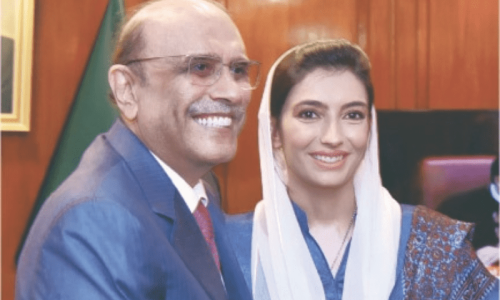ISLAMABAD, April 4: Chief Justice Sheikh Riaz Ahmed on Thursday observed that if his predecessors had accepted the arguments in the Asad Ali case that rule of seniority should be applied prospectively and not retrospectively, the current problems confronting the judiciary might had been avoided.
In the Asad Ali case, Abdul Hafeez Pirzada had argued on behalf of Justice Sajjad Ali Shah, that the rule of seniority laid down in the Judges Case in 1996 should not be applied retrospectively to remove him from the office of chief justice.
The CJ observed that if his predecessors had accepted the arguments the current problems might had been avoided.
Dr Farooq Hasan, appearing for Rai Nawaz Kharal, argued that the government in its reply to the petition, did not disclose anything. The response of the government, he stated, “is evasive and misleading.”
He said it was not for the first time that a judge swiftly reached the highest court of the country, but in every case there were proper reasons for that. Justice Lord Denning, the legendary English judge, was elevated to the highest court of the country at the age of 32, he said and added that extraordinary elevation was the result of his competence as he had laid down the principle of Estoppel. The judge, however, after four years, requested that he should be reverted to the lower court as he did not find himself fit to adorn the highest court.
Without naming Justice Fakeer Khokhar, the counsel argued that there must be some justification for elevating a judge from number 13. He said that facts were being kept under the carpet and he failed to understand why the government was not ready to disclose the reasons for the violation of the seniority rule.
He said the nation wanted to know why the Lahore High Court chief justice and senior puisne judge were ignored and the third, fourth and 13th judges on the seniority list were elevated.
The counsel stated that the president was expected to know the requirements for appointment to the Supreme Court and if he was not expected to read the judgment spanning over 500 pages, it was the duty of the law secretary to inform him about the correct legal position.
On the question that the then chief justice, Irshad Hasan Khan, made recommendations against the vacancies which did not exist at the time, the counsel argued that the tradition was that the chief justices refused to make recommendation six months prior to their retirement.
He cited the example of Chief Justice Hamoodur Rehman who had refused to make recommendation for the appointment of a judge, saying that he would retire after six months and it was the prerogative of the next incumbent to make the recommendation.
In the present case, the counsel argued, the chief justice had made recommendation against the vacancies which occurred on his retirement.
The notification making appointment against a vacancy which did not exist, was nullity in the eyes of law, he said.
He said the chief justice could not make futuristic appointments as his discretion were not unfettered.
The chief justice observed that the courts were required to decide cases while remaining within the limits of the constitution.
The counsel replied that Pakistani courts were deciding the cases while remaining within their limits.
The counsel argued that the provision under which the government had the powers to appoint lawyers as SC judges had been made redundant.
The counsel said no judge was ever appointed directly in the SC.
The chief justice observed that the provision was not made redundant and it was meant for the great jurists and not for ordinary lawyers. He said Sir Zafarullah Khan was appointed directly to the Federal Court.
Justice Qazi Farooq observed that lawyers of high calibre were not ready to become judges as they earned manifold. He said that when he was Peshawar High Court chief justice, he wanted to elevate some promising lawyers to the bench but they refused, saying that they wanted to continue their legal practice.
When Dr Hasan started his argument on the point that the notification issued by President Pervez Musharraf was void from the beginning as he was not the president, the court asked him to save the argument for another case. The CJ observed that he had not raised the point in the original petition and raised it through a civil miscellaneous application. Dr Farooq Hasan agreed and left the rostrum.
Allah Nawaz, former Lahore High Court chief justice and counsel for Zafarullah Khan, chairman of Watan Party, another petitioner, completed his arguments in 30 minutes.
He argued that recommendations of the chief justices were open to judicial review and they must be made public.
He asked why Justice Falak Sher and Justice Mian Nazir Akhtar were ignored. He said that the famous dictum that power corrupts and absolute power corrupts absolutely was applicable to the chief justices as they also were human beings.
Allah Nawaz argued that modalities for the working of the chief justices should also be laid down as those were not spelled out in the Judges Case.
He asked the court to re-visit the Judges Case and remove the defects which had come to light in the last many years.















































Dear visitor, the comments section is undergoing an overhaul and will return soon.